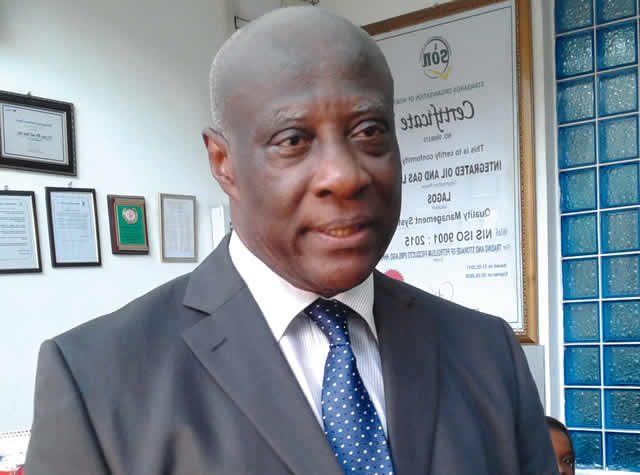
Captain Emmanuel Iheanacho, Chairman, Board of Trustee Crude Oil Refinery Association of Nigeria, and CEO, Eko Refineries & Integrated Oil & Gas Nig Ltd, is a critical stakeholder in the Nigeria Oil and Gas Industry with decades of working in the sector.
In this interview with Global Business Report monitored by MMS Plus, he spoke about the need for more investment in Modular Refineries. He disclosed that having efficient crude oil refining capacity in modular refineries would address the core energy need to support transportation and businesses that require energy for their daily operations. Excerpts

What is the business model for Modular Refineries as far as the valuation is concerned?
Let’s talk about refineries as a whole, refineries produce refined oil from crude oil which serves our transportation system which in turn helps us to move goods and services in our economy.

They produce so many things that we use. Really, that’s the refineries. So, the innovation that we are talking about at this point in time, which is having modular refineries, these are cheaper refineries and more easily installed.
And because of the limited space requirement in their locations, they are the ideal thing to complement what we’ve been doing for so many years. You know, we’ve had four major refineries in Nigeria, two in Port Harcourt, one in Warri, and one in Kaduna. They’ve never functioned. The only thing that is unique about them is that they are public sector owned.
So now we have a situation where private sector entrepreneurs who have the technical capacity, who have the know-how, and in some cases have the resources, can actually produce the same thing that those refineries are set out to produce.
So why don’t we partner with them? If the government-owned refineries have crude oil available to them because this is something that’s in the common ownership of all Nigerians. Give us that crude so that we can bring the technology, bringing our consultants, we build our modular refineries and we produce crude oil that our economy needs to develop.
I want to touch on something you just said. Of the four refineries that we have, the total capacity is 445,000. So modular refineries, by definition, aren’t they smaller? Can you say we have the capacity to be able to have enough modular refineries that can match the outputs of those four state-owned refineries that are not producing?
Well, let me just address an issue that you have touched upon tangentially. Why are we going to be aiming to produce enough fuel just to match the capacity that’s there? You can produce enough for us to use. We can produce enough for us to export to neighboring countries in West Africa.
So why are we going to constrain ourselves to Africa? So Modular refineries are absolutely unique when you talk about the potential that they have for transforming an economy.
They are cheap, they are easy to install, and the space requirements are really limited. And really that is the way for us to go.
How close do they need to be to where crude oil stock is? Do they have to be closer to the source of energy, how closely further with pipelines connecting them? How closely are the logistics required?
Well, there is a very unique situation in Nigeria where we have what you call marginal oil fields, which are fields that have production fields that are no longer producing optimally.
But rather than discard them, we can still get some people to go down and get whatever is there and refine this in addition to what is being produced by the major refineries. So modular refineries can be sited in close proximity to marginal fields.
They can also be sited by the seaside because that is traditionally where refineries are built. So, that that will facilitate the delivery of crude to the refineries and the exportation of the products of those refineries. So, there is no hard and fast rule there.
It is flexible enough for us to utilize so that we can then make those marginal fields that have been discarded there before we make them much more productive.
I have to pick your brain on the removal of fuel subsidies, I am guessing that aren’t modular refineries more upstream? Are Modular refineries in any way impacted by the removal of fuel subsidies at all?
It has absolutely pointed out the imperatives of us investing in modular refineries. Fuel subsidy was a completely wasted policy where monies were targeted, supposedly targeted at poor Nigerians, but actually ended up being appropriated by people who had enough resources to affect the fuel that was being distributed.
Again, of course, there were lots and lots of beneficiaries on either side of the country who participated in the illicit trade of buying subsidized fuel that was meant for Nigerian consumption.
So, if anything, the removal of a fuel subsidy has absolutely pointed out the need for us to have more refineries, more steel-built refineries, and more modular refineries.
And we must not constrain ourselves by saying we want to be able to match the 450 or 480,000 barrels per day capacity of the old refineries. That is not the case. Let me give you an example of the sort of numbers that we really should be looking at.
America is about one and a half times our size. How many refineries do you think they have? 139 refineries.
Texas, a city that you can compare to Lagos in terms of size and population. How many refineries does it have? They have 32 refineries. So, in the whole of the Federal Republic, we only had four refineries and they never worked because they were predominantly in public sector ownership.
And if anything has been proven by their non-performance is the fact that everybody’s business is nobody’s business. So, we really now must hope for a situation where the ingenuity of the private sector entrepreneurs is brought to bear in a union where that crude that was reserved for NNPCL or its share of the production is now given to modular refinery operators and off we go.
Speaking of off we go, the Dangote Refinery, I have to ask you of that, speaking of this fixation on production, that 650,000 production capacity, so much attention has been put on that, would say that it doesn’t have to be just about that?
Completely and totally unnecessary because we are fixated on Dangote 650, 000 BPD refinery, have we asked him what he intends to do with the output? Is he going to sell it predominantly or exclusively in Nigeria?
Would he export a proportion of it or would he export everything? So, we keep on making conjectures without referring to the person who builds the refinery. We should ask him. But to my mind, even if we build two times the capacity of Dangote Refinery. There is a market for them because you will export if you meet the technical specifications, you will export to Europe, you will export to all these small countries in West Africa that end up buying products from Rotterdam.
So, we really should be striving to increase our technology base and build as many refineries as possible. The word hub comes. Let us make ourselves a hub for petroleum products and trade here in West Africa.
What do you make of the whole energy transition debate? Nigeria is a fossil fuel-dependent nation and will the move to more climate-friendly renewable energy threaten your sector?
Well, it would be threatening. Look at what is happening everywhere else. The transition is not going to affect that. We are moving and then we get to one point and the transition happens. It’s something that happens gradually.
We have to join at some point in time. So, we have to join at the point where we are still exploring, exploiting and using fossil fuels. And if at some point in the future it becomes the norm that we don’t use fossil fuels anymore, and we turn to renewables, we will make that transition.
But we could not say we’re going to sit down here and determine the point at which that transition is going to be made and then we jump on board. It will be too late for us at that time.
What’s the engagement going to be like with this new administration?
Well, the engagement is already started because we had an engagement with the former Honorable Minister of State for Petroleum Resources, Timipre Sylva and we were really pleased that he understood the strategic imperative for Nigeria to invest in modular refineries.
And one of the things that he had done, he had established a number of committees. One to look at the issue of crude oil availability, and the other one to look at the issue which bedevils most obvious things that we try to do, availability of funding because local banks really are not sufficiently capitalized to fund them.
So, the move is there. Even a white paper has actually been drawn up to say that this has to be done and look at what we want to achieve over time.
So, what I think the new administration would be able to absolutely have a look at the files, look at the record of the proceedings in the meetings that we have had, and then go forward and implement those things very speedily.
There’s absolutely no reason why we could continue to drag our feet. Modular refineries are the way to go. They will complement any steel built refineries that have become established.
But all in all, modular refineries and steel built refineries, if they are Nigerian refineries, they have market out there for their outputs.
 MMS PLUS NG – Maritime, Aviation, Business, Oil and Gas News Online Newspaper with coverage in Maritime, Oil and Gas, Aviation, Power and Energy as well as Financial News
MMS PLUS NG – Maritime, Aviation, Business, Oil and Gas News Online Newspaper with coverage in Maritime, Oil and Gas, Aviation, Power and Energy as well as Financial News









